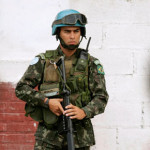March 27 2013 – OpenCanada Interview with Gilberto Rodrigues – With Power Comes Responsibility
Brazil is exerting new-found confidence on the world stage, and it is more than holding its own in debates over human rights issues, including intervention. OpenCanada talked to Gilberto Rodrigues, international relations professor at the Federal University of ABC in Brazil and a board member of the Coordinadora Regional de Investigaciones Económicas y Sociales (CRIES), a Latin American Civil Society Network based in Buenos Aires, Argentina, to explain Brazil’s increased interest in and impact on R2P.
Tell us about the role of the organization CRIES (Coordinadora Regional de Investigaciones Económicas y Socialies) in the development of “Responsibility to Protect”or R2P.
CRIES is a Latin American/Caribbean network based in Buenos Aires, which works on issues of human rights, social integration, and the environment. CRIES was invited to help found the international coalition on R2P and so we decided to create a project on R2P. We have been working on R2P since 2009, especially as it pertains to Latin America and the Caribbean. We have considered these countries’ positions on R2P and explored potential R2P situations in the region.
The concept of Responsibility while Protecting (RwP) was introduced by a Brazilian-led policy paper. What international reactions were sparked by this initiative?
RwP was a very interesting proposal from the Brazilian diplomatic corps. It is revealing of Brazil’s new identity – as an emergent power and global player. The Brazilian diplomatic corps saw room to go into the very sensitive and difficult issue of R2P and intervention. Historically, Brazil has had a very cautious position on intervention. I would say that we have typically leaned against intervention, because as a nation we experienced a lot of unilateral intervention, and we witnessed it elsewhere in Latin America and the Caribbean. We are inclined to be suspicious of intervention because of this history. At the same time, we have a very strong commitment to human rights. The core of R2P is respect for human rights and humanitarian law. Brazil, as a new power and global player, cannot be silent about this, and it has not – we introduced the idea of RwP to the UN General Assembly. RwP is about boundaries, not about avoiding R2P or opposing it. We can accept R2P, as we did in 2005, but we must think about how to implement it. The implementation of R2P from the RwP conception is that we have to implement some boundaries, so boundaries should be clear. RwP provides a list of some of those boundaries.
You have emphasized Brazil’s credentials as a global leader. What are the key examples of Brazil’s leadership on human rights?
Brazil has played a very important role in the creation of many United Nations organs and regional systems of organization. Brazil was one of the countries that promoted the creation of the Human Rights Council at the UN in substitute for the Human Rights Commission. Brazil was also linked to the creation of the new Peacebuilding Commission, and was one of the founders of the ICC. At the regional level, Brazil has been very active – since the democratization period starting in 1985, the Brazilian government, the diplomatic corps, and civil society have supported human rights principles. In 1988, the new Brazilian constitution created a whole chapter for human rights (Article 5). This chapter was crucial for internal reform and the development of democratic institutions in Brazil – it is considered one of the most important legal frameworks that we have had in our history. This also is reflected in our foreign policy – Brazil’s work in United Nations Stabilization Mission in Haiti (MINUSTAH) has been a practical display of Brazil’s commitment to these principles.
What kind of leadership role do you see for Brazil in future?
This is a very interesting question, and one for which there is no clear answer. But I have some ideas. First, this idea of being a ‘global player’ is a new role for Brazil. It will require us to learn how to lead without provoking conflict with our neighbors, namely Argentina, Mexico, and Venezuela. Our government cares a lot about integration processes within South America, so imagine we will continue our work in this area. There are many new issues that could be placed on the civil society agenda, and looked at by the academic community and the private sector. To lead through civil society will require an active, sustained dialogue with the government. So, Brazil could lead on many issues but we need the tools to do so – we need a framework where all sectors of society can participate. Now is a challenging moment for Brazil, for the world is expecting leadership at the global level but we are still developing the institutions that can provide this.
This interview has been edited for length and clarity
Published in: http://opencanada.org/features/the-think-tank/interviews/with-power-comes-responsibility/

